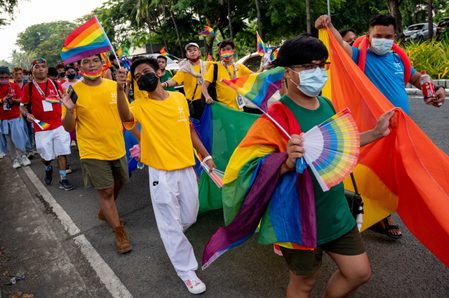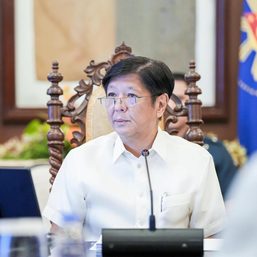SUMMARY
This is AI generated summarization, which may have errors. For context, always refer to the full article.

President Ferdinand Marcos Jr. closes his second year in office, and his second Pride Month as the country’s top leader, with a piece of key legislation for the LGBTQ+ community still missing from his priority bills: the SOGIE Equality Bill.
Marcos has taken progressive stands on various social issues, particularly on women and gender rights. In 2023, he said that the lesbian, gay, bisexual, transgender, queer+ (LGBTQ+) community should be free from discrimination. This is why one might have expected the President to include in his pet bills a measure seeking to penalize discrimination based on sexual orientation, gender identity, and gender expression (SOGIE), but there’s been none so far.
This, after the politically-divided LGBTQ+ rights movement banded together in what they called The Equality Alliance to appeal to Marcos to certify the SOGIE Equality Bill as urgent. It’s been languishing in Congress for over two decades now.
The exclusion of the bill was disappointing to some advocates, but others choose to believe that the President is an ally just grappling with a legislature that still can’t agree on passing the bill.
Forward from Duterte
With the Marcos administration approaching its first half soon, his predecessor Rodrigo Duterte may not so much be a distant memory to some, especially since the two were vastly different on social stands.
Duterte flip-flopped on his position on LGBTQ+ issues. He said he was once gay, but that he was “cured,” implying that being gay was a disease. In 2019, Duterte said he would certify the SOGIE bill as urgent, but took it back a day later.
During the Duterte administration, Dindi Tan, national president of LGBT Pilipinas, wrote the zero draft of an executive order (EO) seeking to create a commission that allowed the LGBTQ+ community a place in the bureaucracy.
Instead of providing stronger representation in the form of a commission, what the Duterte government approved instead was what Tan called a “watered down” version via EO 100, series of 2019, which created the Diversity and Inclusion Program.
When Tan consulted her leaders in LGBT Pilipinas, they said it would “suffice for now,” which she said, consoled her.
Meanwhile, Bahaghari chairperson Reyna Valmores noted the general climate of a “blatant disregard for human rights,” which included rights violations of the LGBTQ+ community.
When COVID-19 lockdowns were in place, LGBTQ+ families were reportedly being denied aid because local governments refused to acknowledge them as legitimate families. Both Valmores and Tan noted instances like this.
“There are many LGBTQ+ who are breadwinners… That gay person feeds his parents and his siblings, and sends his siblings to school. So if you question why we need to be given aid, it is like questioning their capability to be breadwinners,” said Tan.
Valmores also lamented Duterte’s militaristic, punitive style of pandemic governance that may have influenced lower chief executives. In Pampanga, a barangay captain ordered three LGBTQ+ individuals who supposedly broke curfew rules to perform lewd acts.
Enter Marcos, who had to undo not just the culture of misogyny his predecessor normalized, but also deal with an LGBTQ+ rights movement that mostly stayed stagnant at the national level.
Left out
LGBT Pilipinas rallied behind Marcos in the 2022 elections, with Tan believing he was sympathetic to their cause. In a Pride Month message in 2023, Marcos said that the community should be free from discrimination.
“We must applaud and be proud of them for demonstrating the talents of Filipinos. In this New Philippines, Filipinos are free…open-minded, and free from discrimination and ridicule,” he said in a YouTube vlog.
Marcos also held a Pride Reception in Malacañang in June 2023. While Tan, whose group was invited to the affair, said that it was the “clearest evidence” that Marcos was determined to stand with the sector, Valmores of the national democratic Bahaghari noted how the reception was not inclusive of the broader LGBTQ+ movement.

In December the same year, Marcos approved EO 51, creating a special committee on LGBTQ+ affairs. It aimed to strengthen “existing mechanisms to address the continued discrimination against the community and provide them an avenue to participate in policy formulation of the government.”
“We can’t just sit and wait for it to be passed, because we might be dead in the future and it still isn’t approved in Congress,” said Tan. “If there was a deadlock in Congress, then there must be a way to do it via executive.”
Half a year later, Tan, who is also a director at the Overseas Workers Welfare Administration, said that the committee is preparing for the full implementation of its mandate. While Valmores said all avenues for gender equality are appreciated, groups not aligned with the administration have yet to feel the EO’s effects, or to be included in its conversations.
“While EO 51 claims to ‘bridge’ the government and the LGBTQ+ community to hear our concerns, nothing has changed in terms of policy nor real community involvement since EO 51 was made public,” said Valmores.
Ryan Silverio, executive director of the ASEAN SOGIE Caucus, said they have not felt any outreach in their networks either, such as in Pride PH and Lagablab.
“It’s an executive order that should benefit the broad range of the LGBTI movement. So, I hope it moves forward [benefiting] LGBT groups across the spectrum,” Silverio said.
Valmores also said that Marcos has refused to listen to the demands of more progressive groups.
He “dismissed” the community’s pleas for justice for Jennifer Laude, a trans woman killed in 2014 by a Duterte-pardoned US soldier, and instead approved more Enhanced Defense Cooperation Agreement sites for American soldiers on Philippine soil, Valmores said.
Valmores added that Marcos “remains silent” on the continued red-tagging of LGBTQ+ activists.
Recalibrating strategy
The SOGIE Equality Bill hurdled the committee level in the Senate in December 2022, but the Senate leadership has yet to calandar it for deliberations in plenary.
Meanwhile in the House, it has reached plenary, but is still in the period of sponsorship.
The goals of EO 51 tread closely to what the SOGIE Equality Bill aims to do. So if this is where Marcos stood, why couldn’t he list the bill as a priority measure?
According to Bryon Neil Senga, SOGIESC consultant of the University of the Philippines Center for Women’s and Gender Studies (UP CWS), the “polarizing” nature of the bill may be the reason why Marcos has yet to make a national push for the bill.
“It is possible that Marcos Jr….would not want to take risks by taking a strong stance on this. [He] would time and time again express pro-LGBTQI rhetorics but would not meet the actual demands of the community out of the perceived uncertainty of consequences,” he said.
The religious sector has often been seen as the face of the opposition for the SOGIE bill, but Senga said it is not a monolithic bloc. Numerous faith-based groups have advocated in solidarity with the sector such as the Metropolitan Community Church and the Catholic Bishops’ Conference of the Philippines, which has supported the non-discrimination of LGBTQ+ Filipinos.
“It just so happens that faith-based groups who are against the bill have become more organized in recent years while faith-based allies are not yet as mobilized. The latter however is already being prepared,” said Senga.
For Silverio, who uses the pronoun they, it’s a matter of making Marcos see how the SOGIE bill can fit into national priorities, like the continued reopening of the economy from the COVID-19 pandemic. “I think there’s a lot of need for us as a movement to recalibrate our strategy to make this a national agenda…. I don’t think LGBT rights are a priority of the President. I think he recognizes the sector at this point in time, but there are other bigger issues that he has to deal with,” they said.
Silverio highlighted the need to quantify the economic contributions of LGBTQ+ workers, both local and overseas. Queer students who are free from discrimination in their schools will also be able to thrive.
“If we invest a lot in education and technical and higher education training for LGBTI folks and removing all barriers to education, we can have better human development programs. We haven’t seen that yet,” they added.
Tan also saw the need to reassess strategies. While her group was not against Pride parades, Tan pointed to the significance of celebrating Pride Month in more person-to-person engagements.
LGBT Pilipinas has a champion in Malacañang: First Lady Liza Araneta Marcos. Tan calls her their “staunchest ally.” On Monday, June 24, the First Lady led the distribution of financial aid and free medical services to members of the LGBTQ+ community and their families in an event in Mandaluyong.
“We see the First Lady as the mother who takes care of the LGBTQIA+ community. We owe so much to her because she really was the one who pushed for the signing of the EO 51,” said Tan.

Even as the SOGIE bill does not make it to Marcos’ priority bills, Tan believes that there is still time in the Marcos administration to make it happen.
“So, there is a presumption of regularity that given this possible prospect, we can still do more, because we are headed in the right direction,” said Tan.
But for every day without a national law, members of the LGBTQ+ remain at risk to discrimination and hate crimes.
Hope in local governments
While roadblocks remain at the national level, several local governments have gone ahead in passing ordinances that prohibit gender-based discrimination in their areas.
Some of these include Quezon City, Manila, Cebu City, Iloilo City, and Davao City.
Senga of the UP CWS said that apart from protecting LGBTQ+ Filipinos in their communities, ordinances like this signal to other LGUs that the passage of such laws is “possible and beneficial for their respective community.”
“It also shows that there is a growing demand across the country for a national anti-discrimination law and for greater LGBTQI recognition and acceptance.”
Quezon City, in particular, has been trailblazing in local policies beyond non-discrimination. Queer couples in the city have the Right to Care card, which legally enables them to make medical decisions for each other. Transgender individuals can also avail of free health services specialized for their sector.
In a special graduation ceremony in the city on June 22 for LGBTQ+ students who were discriminated against for their SOGIE, Quezon City Mayor Joy Belmonte talked about why the city stays steadfast in LGBTQ+ advocacy, even when it is polarizing.
“The answer is simple. It is the right thing to do. We believe that we can only achieve our goal of becoming inclusive if we give every person the space to be who they are meant to be,” she said.
Will Marcos ride on the momentum of the local governments, and see past conservative pressures? He has four more years to prove he is an ally beyond words. – Rappler.com
All quotes have been translated into English for brevity.
This article is part of “Marcos Year 2: External Threats, Internal Risks,” a series of analyses and in-depth stories assessing the second full year of the Marcos administration (July 1, 2023, to June 30, 2024).
Add a comment
How does this make you feel?







![[IMHO] The other Pride march](https://www.rappler.com/tachyon/2024/06/IMHO-the-other-pride-march-june-20-2024.jpg?resize=257%2C257&crop=277px%2C0px%2C720px%2C720px)



![[OPINION] Power of mimicry: How human rights are covertly undermined in PH](https://www.rappler.com/tachyon/2024/06/duterte-marcos-human-rights.jpg?resize=257%2C257&crop_strategy=attention)



There are no comments yet. Add your comment to start the conversation.